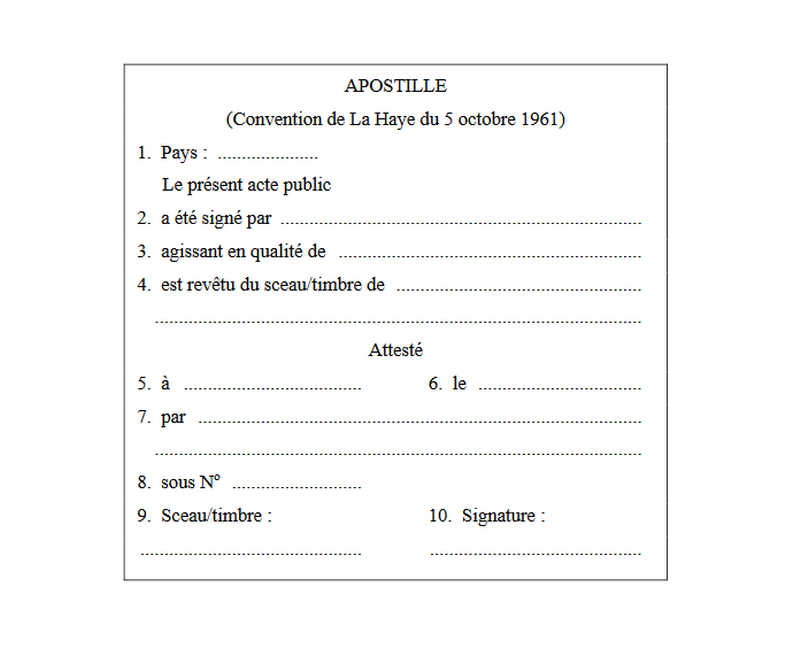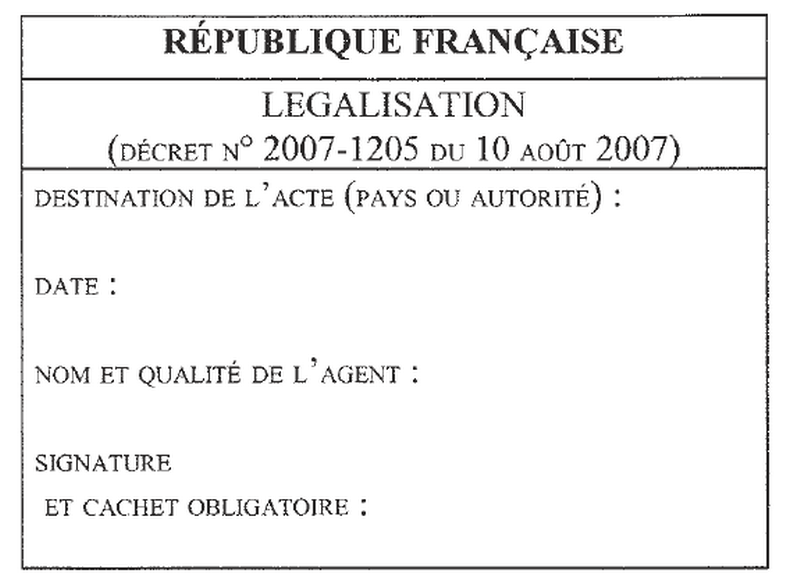
Formality consisting, after verification of the quality, seal and signature of the author of an act, in affixing on the act a stamp, called an apostille. This formality certifies the origin and signature of the document but does not confirm its content.
Austria, Belgium, Bulgaria, Croatia, Cyprus, Czech Republic, Denmark, Estonia, Finland, France, Germany, Greece, Hungary, Ireland, Italy, Lithuania, Latvia, Luxembourg, Malta, Netherlands, Poland, Portugal, Romania, Slovakia, Slovenia, Spain, Sweden
Body of judges representing the interests of the business before the courts
An act drawn up and signed by private individuals without the presence of a notary (for example, a contract)
Document drawn up and signed between the parties without the intervention of a public officer (e.g. notary).
Professional holder of an office to whom the State has delegated the prerogatives of public authority. For example, the power to order the employer of a person ordered to pay damages to seize their wages.
Legal situation that third parties cannot ignore and must respect, even if they are not signatories
Published on 23 May 2023
The rules for issuing the legalization and apostille of a public act drawn up by the French authorities will be amended from 1 er january 2025.
The information contained on this page remains current and will be modified on that date.
Should a French document be legalized or apostilled to make a overseas approach ? Which countries exempt from legalization and/or apostille some documents? What are the formalities for submitting a document? in a country the European Union ?
Here are the main rules to know about procedures for authenticating a signature affixed to a french public document intended to be presented to an authority of a foreigner country.
Legalization and the Apostille do not concern a French document intended for a French administration.
Unfold allTo submit a French document to a foreign authority, prior authentication of the signature of the issuing authority may be required.
For example for an adoption procedure, a judicial procedure, sign a contract.
The legalization is the authentication procedure prior to the signature of the issuing authority.
The Apostille is a simplified procedure of legalization. It replaces legalization for the countries where it applies.
Legalization and the Apostille attest to the following information :
In practice, legalization and the apostille are a official stamp added to the document.
Visual of the Apostille Stamp

Legalization Stamp Visual

Legalization and the Apostille concern the French public acts intended to be presented to a authority of a foreigner country.
The following documents are considered as public acts :
The documents drawn up by a diplomatic or consular official and administrative documents concerning a commercial or customs operation (for example, a health certificate) are public acts. However, those acts cannot be apostilled.
How to make a privately signed act public
One privately signed document cannot be legalized or apostilled as is.
To be legalized or apostilled, a official declaration must be affixed to the document, giving it the character of a public act.
Examples of official declarations:
Whether a translation can be legalized or apostilled
To be legalized or apostilled, the translation must meet the following conditions:
The translation must be submitted with the original document.
Répondez aux questions successives et les réponses s’afficheront automatiquement
Austria, Belgium, Bulgaria, Croatia, Cyprus, Czech Republic, Denmark, Estonia, Finland, France, Germany, Greece, Hungary, Ireland, Italy, Lithuania, Latvia, Luxembourg, Malta, Netherlands, Poland, Portugal, Romania, Slovakia, Slovenia, Spain, Sweden
Austria, Belgium, Bulgaria, Croatia, Cyprus, Czech Republic, Denmark, Estonia, Finland, France, Germany, Greece, Hungary, Ireland, Italy, Lithuania, Latvia, Luxembourg, Malta, Netherlands, Poland, Portugal, Romania, Slovakia, Slovenia, Spain, Sweden
Some French public documents may be presented without authentication formality to one authority of a the European Union .
These are the public documents which concern next domains : birth, being alive (life certificate), death, name, marriage, including capacity to marry and marital status, divorce, legal separation and annulment of marriage, civil pact of solidarity (Civil partnerships), dissolution annulment of Civil partnerships, filiation, adoption, domicile and/or residence, nationality, absence of criminal record.
See the e-justice site for public documents accepted by countries European without authentication formalities.
Whether a French public document accepted without formality must be accompanied by a translation
One multilingual form may be attached to certain public documents to avoid the need for translation.
You must request the multilingual form from the issuing authority.
However, the receiving authority of the country may request a translation if necessary.
In this case, the translation must be done by a sworn translator.
Different rules apply to other public documents (e.g. passport, identity document): they are exempt from authentication formalities or shall be apostilles .
To check whether the document should be distilled or not, you should consult the summary of rules by country updated by the Ministry of Foreign Affairs.
To check if the document should be legalized, apostilled or is exempt from formality, you should consult the summary of rules by country updated by the Ministry of Foreign Affairs.
You can also ask the embassy or consulate in France of the destination country.